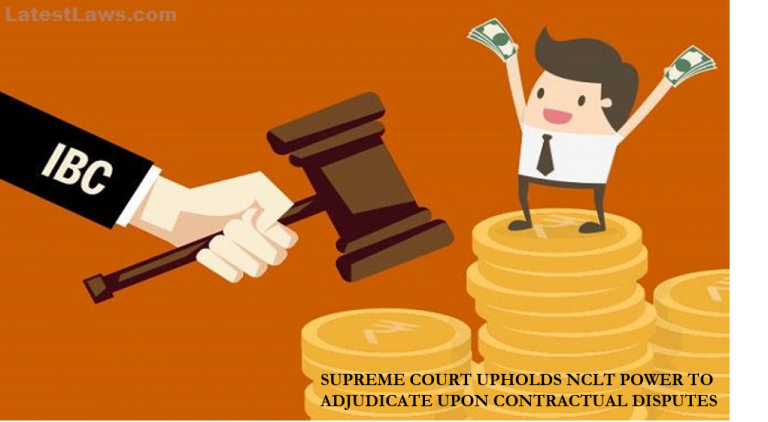SUPREME COURT UPHOLDS NCLT POWER TO ADJUDICATE UPON CONTRACTUAL DISPUTES
The Two Judge Bench of the Hon’ble #SupremeCourt of India comprising of Justices DY Chandrachud and M.R. Shah Reddy passed a Judgment dated 08.03.2021 in the case of Gujarat Urja Vikas Nigam Limited v. Mr. Amit Gupta & Ors. {Civil Appeal Nos.9241 of 2019 and held that the National Company Law Tribunal (#NCLT) has the #jurisdiction to adjudicate upon #disputes or issues arising from or which relate to the #Insolvency of #CorporateDebtor.
In the present case, the Power Purchase Agreement (PPA) was signed on 30-04-2010, which stipulated that the Gujarat Urja Vikas Nigam Limited (hereinafter Appellant) had to purchase all the power generated by the Corporate Debtor. On 20-11-2018, NCLT admitted a Petition filed by the Corporate Debtor under Section 10 of the IBC and commenced the Corporate Insolvency Resolution Process (CIRP) and issued an Order of Moratorium. On 1-05-2019, the Appellant issued two notices of default to the Corporate Debtor in which it stated as follows:
- Under Article 9.2.1(e) of the PPA, the Corporate Debtor undergoing CIRP under the IBC amounts to an event of default.
- Under Article 9.2.1(a) of the PPA, there was a default in the operation and maintenance of the Plant.
The Appellant rejected the reply issued by the Corporate Debtor and stated that they will terminate the PPA under Articles 9.2.1(e) and 9.3.1 since the Corporate Debtor is under CIRP. In May, 2019 the Corporate Debtor filed Applications under Section 60(5) of the IBC before the NCLT in regard to the Notices issued by the Appellant to the Corporate Debtor, and sought an injunction restraining the Appellant from terminating the PPA.
Section 60(5) of IBC is reproduced as follows:
(5) Notwithstanding anything to the contrary contained in any other law for the time being in force, the National Company Law Tribunal shall have jurisdiction to entertain or dispose of—
a) any application or proceeding by or against the corporate debtor or corporate person;
b) any claim made by or against the corporate debtor or corporate person, including claims by or against any of its subsidiaries situated in India; and
c) any question of priorities or any question of law or facts, arising out of or in relation to the insolvency resolution or liquidation proceedings of the corporate debtor or corporate person under this Code.
Vide Order dated 29-08-2019; the NCLT restrained the Appellant from terminating the PPA.
Aggrieved, the Appellant approached the Hon’ble Supreme Court. One of the issues which came before the Bench was whether NCLT/NCLAT can exercise jurisdiction under the IBC over contractual disputes such as those arising from PPA?
Before the Apex Court, the Appellant contended that the NCLT does not possess any inherent powers and it can only exercise its jurisdiction within the limits prescribed by the provisions of the IBC and thus it does not have the power to decide or entertain all disputes related to the Corporate Debtor. On the other hand, the Corporate Debtor argued that although the NCLT may not have the jurisdiction to adjudicate upon contractual disputes that arise independent of the insolvency of the Corporate Debtor, it has the sole jurisdiction to decide a dispute that arises from or relates to the insolvency of the Corporate Debtor.
Taking into consideration the arguments advanced by the Parties to the dispute, the Bench observed that the ground for termination of PPA was the insolvency, since the event of default contemplated under Article 9.2.1 (e) was the commencement of the insolvency proceedings against the Corporate Debtor “In the absence of the insolvency of the Corporate Debtor, there would be no ground to terminate the PPA. The termination is not on a ground independent of the insolvency. The present dispute solely arises out of and relates to the insolvency of the Corporate Debtor” the Court noted.
Furthermore, the Apex Court held that “…we hold that the RP can approach the NCLT for adjudication of disputes that are related to the insolvency resolution process. However, for adjudication of disputes that arise dehors the insolvency of the Corporate Debtor, the RP must approach the relevant competent authority. For instance, if the dispute in the present matter related to the non-supply of electricity, the RP would not have been entitled to invoke the jurisdiction of the NCLT under the IBC. However, since the dispute in the present case has arisen solely on the ground of the insolvency of the Corporate Debtor, NCLT is empowered to adjudicate this dispute under Section 60(5)(c) of the IBC.”
While dismissing the Appeal, the Hon’ble Supreme Court held the following:
- Since the Appellant sought to terminate the PPA under Article 9.2.1 (e) only on the ground that CIRP had been initiated against the Corporate Debtor, the NCLT/NCLAT could have exercised jurisdiction under Section 60(50(c) of the IBC to stay the termination of the PPA.
- The NCLT/NCLAT committed no error in staying the termination of the PPA by the Appellant, since the termination would certainly result in a crucial loss to the Corporate Debtor as the PPA was its sole contract.
The Supreme Court has therefore recognized and upheld the powers of NCLT/NCLAT that deal with contractual disputes between the Parties if the said contractual obligations pertaining to the CIRP proceedings of the Corporate Debtor.
Suchitra Upadhyay
Associate
The Indian Lawyer & Allied Services





































Leave a Reply